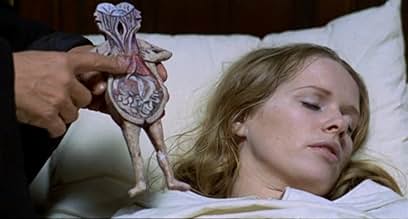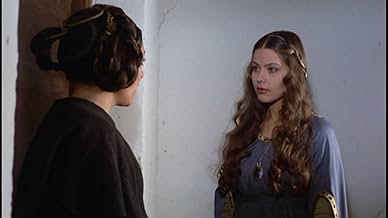A female vampire rises from her crypt every night in search of children as her victims.A female vampire rises from her crypt every night in search of children as her victims.A female vampire rises from her crypt every night in search of children as her victims.
José María Prada
- L'homme Mystérieux
- (as José Mª Prada)
José María Caffarel
- Le Médecin
- (as José Mª Caffarel)
Storyline
Featured review
The combination of "slow," "arthouse," "surreal" and "horror" is very appealing to me, so it was disappointing upon finally seeing this mid-70s flop to find out that it does actually deserve its rep as something of a lifeless slog. The problem isn't the lack of overt "horror" content (at least that's not a problem for me), though if you're expecting more, it will no doubt be disappointing that Ullmann's quasi-vampiric slayings of children are no more explicit than her enfolding them in her cloak. But the film simply lacks style and atmosphere, as well as verve, so the human aspects are as limp as the supernatural ones.
We only meet Leonor on her deathbed, so we get no sense of her (before her revival from the dead), or the Piccoli character's supposed great love for her. It's a bit hard to believe in the latter, as the very day she's buried he demands to marry young Ornella Muti, to the bafflement of her, her father, and the viewer. Nor does he express any notable emotions (beyond eventual impatience and hostility) towards his new bride, either. Ergo we feel nothing about the passion that supposedly leads him to resurrect one wife and neglect, then destroy another. He's a selfish, combative, unappealing character. That element might have provided its own social commentary, but the film doesn't seem to be saying anything in particular with it. The two women are beautiful, but their considerable acting skills are put to little use here. (Nor does it help that both are dubbed by others in the English language version I saw--it's particularly weird to be deprived Ullmann's familiar voice.)
The film is not so much badly as indifferently made, which is odd considering the director's pedigree (and the fact that it was his debut feature). It's watchable, but stubbornly refuses to become hypnotic, frightening, insightful, or any of the other things you might hope for. I saw the longer original cut, presuming it would be better than the shorter (by about 15 minutes) U.S. version, which was very poorly received. But I suspect the shorter edit simply made the story less comprehensible, without making it any livelier, and the long version isn't exactly dull, just very flat. If a director with more visual and atmospheric flair, say anyone from Bava to Herzog, had made this around the same time, it might have turned out brilliantly. But the best you can say about Juan Bunuel's handling is that it is technically competent if uninspired--not what you want from a film about a love that defies death itself.
We only meet Leonor on her deathbed, so we get no sense of her (before her revival from the dead), or the Piccoli character's supposed great love for her. It's a bit hard to believe in the latter, as the very day she's buried he demands to marry young Ornella Muti, to the bafflement of her, her father, and the viewer. Nor does he express any notable emotions (beyond eventual impatience and hostility) towards his new bride, either. Ergo we feel nothing about the passion that supposedly leads him to resurrect one wife and neglect, then destroy another. He's a selfish, combative, unappealing character. That element might have provided its own social commentary, but the film doesn't seem to be saying anything in particular with it. The two women are beautiful, but their considerable acting skills are put to little use here. (Nor does it help that both are dubbed by others in the English language version I saw--it's particularly weird to be deprived Ullmann's familiar voice.)
The film is not so much badly as indifferently made, which is odd considering the director's pedigree (and the fact that it was his debut feature). It's watchable, but stubbornly refuses to become hypnotic, frightening, insightful, or any of the other things you might hope for. I saw the longer original cut, presuming it would be better than the shorter (by about 15 minutes) U.S. version, which was very poorly received. But I suspect the shorter edit simply made the story less comprehensible, without making it any livelier, and the long version isn't exactly dull, just very flat. If a director with more visual and atmospheric flair, say anyone from Bava to Herzog, had made this around the same time, it might have turned out brilliantly. But the best you can say about Juan Bunuel's handling is that it is technically competent if uninspired--not what you want from a film about a love that defies death itself.
- How long is Leonor?Powered by Alexa
Details
- Release date
- Countries of origin
- Official site
- Languages
- Also known as
- Leonor, the Devil's Mistress
- Production companies
- See more company credits at IMDbPro
Contribute to this page
Suggest an edit or add missing content






























